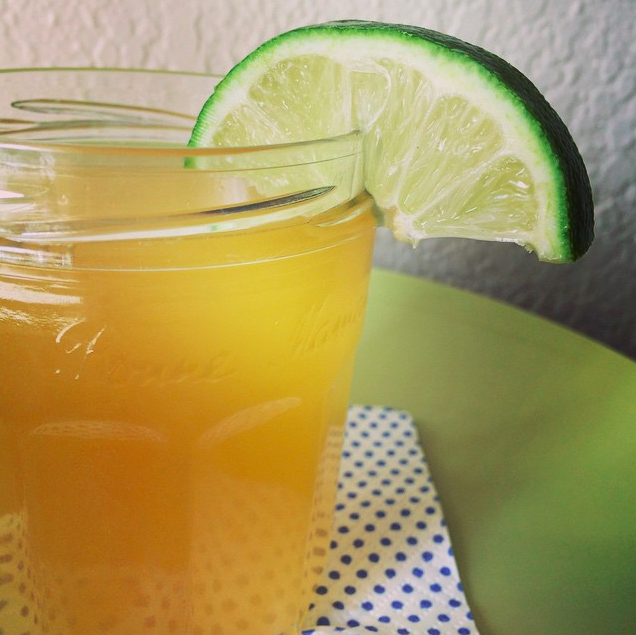
In each monthly installment of Bender, Caroline Ferguson will explore the social, cultural, and historical context of a single cocktail or boozy beverage. From settling which country lays claim to Pisco, to exploring the Carthusian Monks’ Chartreuse caves, Caroline will try to track down all the places your drink has been before it gets in your glass—always ending with a recipe of her own creation. Pull up a chair and a glass.

Photo by Matthew Vrvilo.
When we talk about the amount of time a farmer invests in a garden, that time is rarely limited to a single growing season. Whether it’s a Golden Delicious apple from a 50-year old tree or an heirloom Jory tomato seed that has been passed down for generations, food takes time to grow—often more than just a single farmer's lifetime. One farmer straddling the bridge between the past of her hundred-year-old conventional apple orchard and the future of organic farming is Jeannie Berg of Queener Farm in Scio, Oregon. In an age of chemical dependency on pesticides, environmentally irresponsible mono-cropping, and genetic modification for higher yields, Berg is harkening back to the organic practices of Queener's original homesteaders to grow foods that are well adapted to the local terroir and bring back the flavors of yesteryear.
Berg assumed the rather monumental task of taking over Queener Farm after being approached in May of 2014 by the previous owners, who had been taking care of the land for a decade. She was already handling several parcels of land around Independence at the time, growing 21 different tomato varieties (including the Jory tomato, a canning varietal that Berg brought back into availability with the help of Adaptive Seed), the elusive Trombonzino squash (which Berg overnighted to Dan Barber's restaurant Blue Hour in New York back in 2013), fava beans, winter squash, rhubarb, and a handful of native plants (including stinging nettles, miner's lettuce, and maple trees).
Success on a farm is about timing and balance, especially with a farm that was born before the widespread use of pesticides. The 50-year old Gravenstein apple trees give a hint of the age of the orchard itself, while the barn, erected in 1939, was built the same year that DDT was invented and the movement towards chemical farming began. Because of the cultural shift in farming techniques that Queener has witnessed over its hundred-year history, bringing microbial life back to the soil and beneficial insects to the area are arduous tasks. When Queener was originally homesteaded in the 1880s, pesticides were an unimagined future. Now, as the farm continues to persevere, Berg has brought Queener full-circle, harkening back to the methods of the original homesteaders of the property. Both were and are farming in a more natural way as well as with a more localized outlook.
For Berg, the challenge at hand now is the transition of Queener Farm from its conventional past to its organic future—and that takes time. For her, the shift towards organic is tied to a desire for a healthy and sustainable Earth rather than the higher yields touted by conventional farming methods, which kill off both pests and beneficial insects. The number and variety of microorganisms in the soil are depleted by the use of chemicals, which affect the soil quality over time and make it difficult to diversify the farm's crops. But because of the large number of varieties of apples that Berg grows, the chefs and restaurants that buy them aren't even asking her to change. So why bother?
"For us, it's more about using organic practices than being [simply] certified organic… I want a farm with a good balance of beneficial insects with a thriving ecosystem and I want to eat food that's not chemically raised. I want healthier soil, I don't want to use a lot of herbicides that are going to kill my microbial life. Part of it is just wanting a healthy farm, from the soil to the fruit."
Before acquiring Queener Farm, Berg found herself at a crossroads with her own past and future. For fifteen years, she worked in local government, primarily in agricultural policy under Congresswoman Darlene Hooley. At the time, there wasn't yet a separate division that focused on agriculture, which gave Berg the unprecedented opportunity to meet farmers and agriculture workers, tour farms, survey, document, and ultimately learn. When Hooley retired in 2008, the food movement was picking up and Berg had already gotten involved with food justice groups as a result of the food policy work that fell under her jurisdiction. She had a choice to make: the life of a politician or the life of a farmer.
Realizing that she wanted to work with the land, Berg decided to move away from policy work and forward into farming. She established a small business called Your Home Harvest that quickly spiraled into something more significant due to the fifteen years she had spent forging connections with the local farming community. When she started Your Home Harvest, she built around forty gardens in the first year. Later that year, people started offering her land to farm. After around seven or eight offers, Berg decided to let the obvious path forming before her be her guide. It took a few years, but that decision ultimately led her to Queener Farm.
And now Berg is looking at a ten-year contract with Queener, with the goal of transforming it from the orchard that it has been in the past to the cornucopia of diversity that it will be in the future. And after that? It depends. There are environmental issues to consider, of course, as well as the changing economy. But most of all, Berg wants to be growing heirloom plants, taking care of farmland, and continuing to influence those around her to work with nature’s predilection for diversity and against mono-cropping and chemical dependency. Her future on the farm is really a step backward in time, embracing bio-diversity and a re-established connection with the earth. Growing quality food that is well adapted to an area is a long-term commitment, one with a long history and – if Berg has any say in it – a long future.







































